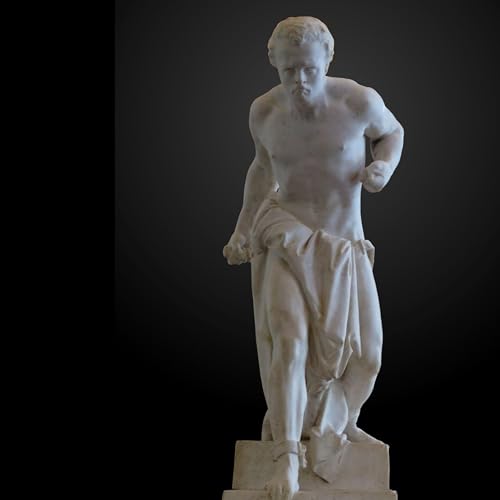
Spartacus in Fact and Fiction
カートのアイテムが多すぎます
ご購入は五十タイトルがカートに入っている場合のみです。
カートに追加できませんでした。
しばらく経ってから再度お試しください。
ウィッシュリストに追加できませんでした。
しばらく経ってから再度お試しください。
ほしい物リストの削除に失敗しました。
しばらく経ってから再度お試しください。
ポッドキャストのフォローに失敗しました
ポッドキャストのフォロー解除に失敗しました
-
ナレーター:
-
著者:
このコンテンツについて
In this episode—the final episode in a three-part series on gladiators—Emily and Cam focus on Spartacus, the most famous gladiator of all. They first discuss the causes of Spartacus’ rebellion against the Romans, and then explore how Spartacus has been represented in modern literature and film.
- Cover image: Vincenzo Vela, Spartacus (1848); photograph by Rama (Wikimedia commons)
Links:
- “I am Spartacus”: an iconic scene from Kirk Douglas’ 1960 film
- Pepsi’s “Spartacus” commercial
- “The Son of Spartacus”: an unofficial 1962 sequel to the Kirk Douglas movie, starring Steve Reeves
Visit our homepage to subscribe and to find us on social media:
- https://havetogawilltravel.com
----------
00:10 - Introduction
01:11 - The sources: what can we know about Spartacus?
- 01:27 - Plutarch, Appian, and their interest in Spartacus
- 02:17 - Sallust: the original source
02:58 - Spartacus: a basic biography
- 03:05 - Spartacus' origin in Thrace, among the Maidi
- 03:16 - Spartacus' brief career as a Roman auxiliary and as a latro
- 03:49 - Spartacus enslaved and sold to the ludus of Lentulus Batiatus
- 04:44 - The gladiators escape from Batiatus’ ludus, seek refuge on Mount Vesuvius, and defeat several forces sent to suppress them
- 07:07 - As the rebellion gathers steam, Spartacus and his supporters drive north, and defeat three Roman armies along the way
- 10:04 - After Spartacus’ army turns south again, winning yet another major battle, the Romans entrust Crassus with the responsibility of ending the rebellion
- 11:49 - The Romans outmaneuver Spartacus and defeat the rebels
15:31 - Why did Spartacus and his supporters rebel?
- 15:51 - Enslaved people and small-scale resistance
- 17:28 - What made large-scale rebellions so difficult
- 18:40 - Poor living conditions as a motivation for rebellion: gladiators, enslaved herdsmen, enslaved agricultural workers
- 21:16 - Poor prospects for winning manumission as a further motivation for rebellion
- 23:03 - Many of the rebels had been enslaved only recently and longed to reclaim their freedom
24:52 - What were Spartacus and his supporters attempting to accomplish?
- 25:15 - To escape from Italy, or not? The sources and the problem of reconstructing Spartacus’ plans
- 27:01 - Modern approaches: (1) The sources had it right; (2) Spartacus had a larger agenda—whether to destroy the hegemony of Rome in Italy, or to end slavery
- 28:15 - A critique of these approaches, and an alternative: staying together was the best guarantee of freedom
31:16 - The ongoing resonance of Spartacus in modern literature, film, and television
- 32:29 - The discovery of Spartacus by French and Italian thinkers in the 18th and 19th centuries
- 33:35 - The Marxist and communist take on Spartacus
- 35:40 - 20th century novels: Koestler’s “The Gladiators” and Fast’s “Spartacus”
- 38:20 - Spartacus goes to Hollywood: Kirk Douglas’ 1960 film and Spartacus as social revolutionary
- 49:08 - A Spartacus for the 20th century: Andy Whitfield as Spartacus
51:05 - Wrap-up
まだレビューはありません


